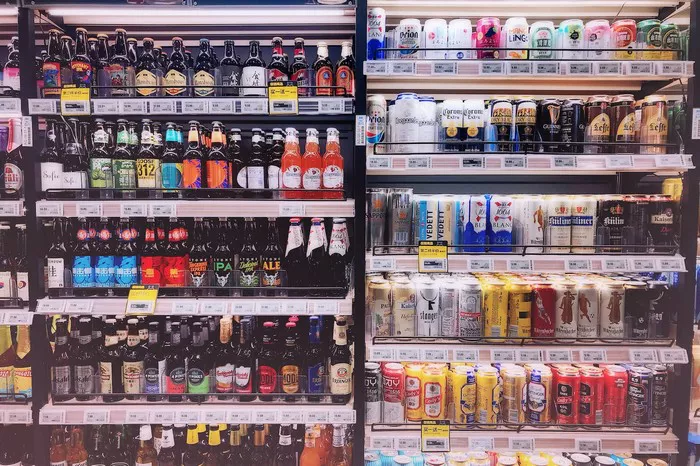If you’re looking to cut back on beer consumption or explore alternatives for a variety of reasons, there are plenty of enjoyable options to consider. Whether you’re seeking healthier choices or simply looking to diversify your beverage selection, this article will introduce you to a range of alternatives to replace beer.
1. Non-Alcoholic Beer
Flavor Without the Alcohol: Non-alcoholic beer offers the taste and aroma of traditional beer without the alcohol content. It’s a great choice if you enjoy the flavor of beer but want to avoid the effects of alcohol.
2. Craft Soda or Soft Drinks
Craft Soda: Craft sodas, often made with natural ingredients and unique flavor profiles, can be a satisfying and flavorful alternative to beer.
3. Sparkling Water
Refreshing and Hydrating: Sparkling water, whether plain or flavored, offers a refreshing and hydrating option. You can enjoy it with a twist of lime or lemon for added zest.
4. Iced Tea
Variety of Flavors: Iced tea comes in a wide variety of flavors, including herbal, green, and black teas. It’s a great choice for those who appreciate a refreshing and caffeine-free option.
5. Fruit Juices
Natural Sweetness: Freshly squeezed fruit juices provide natural sweetness and a burst of vitamins and antioxidants. Consider options like orange juice, apple juice, or a refreshing blend of tropical fruits.
6. Mocktails and Virgin Cocktails
Creative and Flavorful: Mocktails are non-alcoholic cocktails that offer a creative and flavorful experience. Try a virgin Mojito, Virgin Pina Colada, or a classic Virgin Mary (non-alcoholic Bloody Mary).
7. Kombucha
Probiotic Goodness: Kombucha is a fermented tea beverage known for its probiotic benefits. It offers a unique and slightly tangy flavor profile.
8. Cold Brew Coffee
Caffeine Kick: If you enjoy the boldness of beer, consider cold brew coffee as an alternative. It provides a caffeine kick with a smooth and rich flavor.
9. Smoothies
Nutrient-Packed: Smoothies made with fruits, vegetables, yogurt, and other nutritious ingredients can be a filling and nutrient-packed option
10. Coconut Water
Natural Electrolytes: Coconut water is a natural source of electrolytes and can be especially hydrating after physical activity.
11. Herbal Tea
Relaxing and Calming: Herbal teas, such as chamomile, peppermint, or lavender, offer relaxation and calming effects.
12. Milkshakes or Dairy-Free Alternatives
Creamy and Indulgent: Milkshakes or dairy-free alternatives like almond milkshakes can satisfy your craving for a creamy and indulgent beverage.
Conclusion
Replacing beer with healthier and enjoyable alternatives is a choice that can align with various lifestyle goals and preferences. Whether you’re seeking to reduce alcohol intake, explore new flavors, or prioritize health and well-being, these options offer a wide range of choices. Remember to consume beverages in moderation and make choices that align with your personal preferences and goals.
FAQs related to the topic of healthy alternatives to replace beer:
Q1: Why would someone want to replace beer with alternatives?
A1: There are various reasons why someone might want to replace beer with alternatives. These reasons can include health goals, dietary preferences, sobriety, or simply wanting to diversify their beverage choices.
Q2: Is non-alcoholic beer a good alternative to regular beer?
A2: Non-alcoholic beer can be a good alternative for those who enjoy the taste of beer but want to avoid alcohol. It provides the flavor and aroma of beer without the alcohol content.
Q3: Are non-alcoholic beers the same as alcohol-free beers?
A3: Non-alcoholic beers and alcohol-free beers are terms often used interchangeably to refer to beers with very low alcohol content (typically less than 0.5% ABV). They are suitable for those looking to avoid alcohol.
Q4: What are some considerations when choosing alternatives to beer for health reasons?
A4: When choosing alternatives, consider factors such as calorie content, sugar content, nutritional value, and any dietary restrictions or allergies you may have.
Q5: Are there alternatives that provide a similar social experience to drinking beer?
A5: Yes, mocktails (non-alcoholic cocktails) can offer a similar social experience to drinking beer. They come in various flavors and can be enjoyed in social settings.
Q6: What is the nutritional value of fruit juices as alternatives to beer?
A6: Fruit juices can provide vitamins, minerals, and antioxidants, but they can also be high in natural sugars. It’s important to consume them in moderation and opt for fresh, unsweetened juices when possible.
Q7: Can kombucha be a good alternative to beer for its health benefits?
A7: Kombucha is known for its probiotic benefits and unique flavor. It can be a good alternative if you’re seeking a beverage with potential health advantages.
Q8: Are there non-alcoholic alternatives for those who enjoy the bitterness of beer?
A8: Yes, there are non-alcoholic craft beers that offer bitterness and flavor profiles similar to traditional beers. These can be a suitable choice for those who enjoy beer’s bitterness.
Q9: Are there alternatives to beer that can be used in cooking or for marinades?
A9: Many non-alcoholic alternatives, such as non-alcoholic wine, can be used in cooking and marinades to add flavor without alcohol content. Additionally, ingredients like vinegar or citrus juices can serve as alternatives.
Q10: What should I consider when introducing these alternatives to my diet?
A10: Consider your personal preferences, health goals, and any dietary restrictions. Experiment with different options to find alternatives that suit your taste and align with your lifestyle choices.


